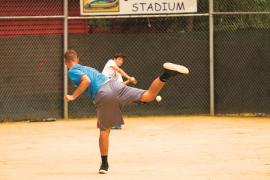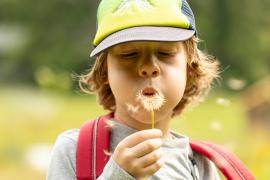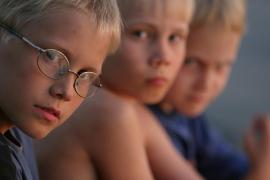Welcome to summer camp, potentially the most rewarding job you’ll ever have! At camp, we are able to simultaneously help kids grow, make genuine connections with campers and fellow staff, and role model the best version of ourselves in the service of others. When done well, camp offers a rare and profound experience for everyone involved.
That doesn’t mean it’s easy. Working at camp can be an intensely challenging job, and that’s precisely why it’s so rewarding. It’s the very process of overcoming challenges that leads to growth, both for our campers and ourselves.
Whether you have yet to experience this firsthand or know exactly what I’m talking about, let’s dig in to why camp can be this way. When we understand the underlying elements and mechanisms that lead to growth, we can be intentional with our work, which leads to even better outcomes for all.
Whether you intend to pursue a career working with kids or not, the skills you’ll learn and practice this summer will better equip you for life. These are the same skills that you’ll be intentionally developing in your campers as you meet the goal of camp: to help campers grow.
What Are Social-Emotional Learning Skills?
Let’s begin by defining social-emotional learning (SEL) skills. Much research has been conducted around these social and emotional skills, but we don’t have a simple or consistently accepted definition of the term, especially across different academic disciplines and practice settings. Depending on the source, we may find various labels for the same concept, or even misinformation about what the term SEL really means.
Many of the same or at least similar and interrelated skills have had different names through the years. In 1995, Daniel Goleman published Emotional Intelligence. In 2004, Christopher Peterson and Martin Seligman published Character Strengths and Virtues. Paul Tough references character along with grit in his 2012 book How Children Succeed, and Angela Duckworth spotlighted grit specifically in her 2016 book of the same name.
Organizations focused on the future of the workforce have called them “21st-century skills,” referencing the particular strengths sought by employers, while the World Health Organization (WHO), UNICEF, and leading nonprofits like the JED Foundation have used the term “life skills” (WHO, 2020; UNICEF, 2005, JED, n.d.).
In recent years, the Collaborative for Academic, Social, and Emotional Learning (CASEL) has emerged as a leader in research and implementation of programs that promote SEL, and this particular label has gained momentum beyond the education sector.
CASEL defines SEL through a framework of five core competencies (2023):
- Self-awareness
- Self-management
- Responsible Decision-making
- Social Awareness
- Relationship Skills
Let’s get a bit more specific and granular for the camp setting.
- Self-awareness: the ability to observe or sense our own feelings and behaviors
- Self-management: the ability to regulate our emotions and to have control over our behaviors by choosing our responses rather than instinctually reacting to the world around us
- Social Awareness: the ability to read social cues in others, to accurately interpret the world around us, and to have empathy for others
- Responsible Decision-making: the ability to predict outcomes and choose between different options in what we say and do
- Relationship Skills: communication, collaboration, cooperation
Many of these skills overlap, intertwine, and cannot be fully separated into clean categories. Furthermore, we can add skills or characteristics such as curiosity, creativity, optimism, gratitude, and zest. These concepts certainly fit under an umbrella of social and emotional skills, but they may also include elements of cognition or spirituality that haven’t been included in CASEL’s model of SEL.
For camp, we don’t need specific, consistent, or widespread definitions for these skills. What matters to us is how important these skills are and how we can develop them in our campers and ourselves.
Why Focus on SEL at Camp?
While the definitions may not be entirely consistent, the research is overwhelmingly positive. SEL skills are critical for success across stages of life and in all settings:
- Academics and education
- Workplace and career
- Relationships
- Physical and mental health
- Civic participation
As 2022 American Camp Association (ACA) National Conference keynote speaker Denise Pope, PhD, wrote with Lisa Westrich in an ACA blog post (Westrich & Pope, 2018):
We know from existing research that social and emotional skills are critical to young people’s academic success, and that children must have the opportunity to practice and develop SEL skills such as empathy, perseverance, and collaboration, in order to thrive in careers, in family, and in community as adults.
Most camp directors don’t need to see research to believe in the importance of SEL or the power of camp as a developmental environment for such skills. But this research gives the kind of evidence-based credibility that is needed to secure funding to expand access to camp opportunities for all kids.
As we highlight our strengths, let’s not ignore our shortcomings. The camp industry as a whole has a long way to go toward creating camps that are diverse, equitable, and inclusive for all campers and staff. We need more spaces and experiences where children and adults of all backgrounds, income levels, and abilities can feel a sense of acceptance and belonging along with opportunities for fun, friends, and growth. Research has shown that SEL skills are associated with youth well-being and increased positive developmental trajectories, regardless of race, socioeconomic background, or location. (Taylor et al., 2017).
How Do We Promote SEL at Camp?
The research base also tells us why camp is such a fertile environment for the growth of these critical skills.
Perhaps the biggest push in recent years has been toward getting more SEL skill development into school curriculums. This is great, but what the research shows is that it’s out-of-school-time environments like camp that offer the most robust environments for SEL skill development.
What do we do at camp that promotes SEL skills development? We provide:
- Physical and emotional safety
- Strong, supportive, and connected relationships with peers and adults
- Engaging, fun activities that promote inclusion and belonging
- Structure and positive social norms
- Opportunities for engagement, practice, and reflection
As Pope and Westrich wrote (Westrich & Pope, 2018):
Research also tells us that effective learning environments are ones where kids have a sense of physical and emotional well-being, a strong sense of belonging, and are engaged — affectively (interest, fun, enthusiasm), behaviorally (active participation), and cognitively (reflecting, making choices, having opportunities to give input).
Additionally, ACA’s own research division backs this up through camp-specific studies on program quality and outcomes. But whether you are involved in research efforts to demonstrate positive outcomes or not, you can feel confident that if you are providing the right environment and opportunities for campers, they will be developing these critical skills with your help this summer.
SEL in Practice at Camp
Are you thinking all this research is great but wondering how it applies to your job at camp? Every camp is different, so ultimately, the specific ways in which you provide the right environment and opportunities for the campers in your charge are up to you and your camp’s program. Pay attention to the following program elements. Your assessment may help camp leadership identify areas in which you can be more intentional and effective. For example:
- Physical and emotional safety: How does your camp manage physical hazards to minimize injury during activities? What practices are in place to ensure that campers feel accepted for who they are — not bullied, excluded, or fearful of threats or verbal abuse.
- Strong supportive and connected relationships with peers and adults: What practices are in place to promote campers meeting and becoming friends with each other? What practices are in place to promote connection between campers and counselors, and what practices are in place to set appropriate boundaries and keep campers and staff safe?
- Activities that are engaging and fun, and promote inclusion and belonging: How are activities (or other periods in the daily schedule) structured, and how could they do a better job of including everyone and helping campers feel seen, heard, and valued?
- Structure and positive social norms: How do you and other staff set expectations and limits to guide and encourage positive behaviors and interpersonal interactions? How do you role model the attitudes and behaviors you want to see in the campers — and how do you reinforce that camp-wide?
- Opportunities for engagement, practice, and reflection: How is camp structured to provide opportunities for campers to practice skills? Not just the “hard skills” of the activity, such as archery, sports, or arts and crafts, but the SEL skills of cooperation, communication, perseverance, and emotion regulation. After any activity where campers have to use these skills (i.e., all camp activities), are there opportunities for campers (and you as staff) to reflect on how it went, what they learned, and how that might benefit them in the future?
We do some of our most impactful work through this process of reflection, shifting campers’ attention to becoming aware of their strengths, their growth, and their progress.
Children develop their sense of self as they see it reflected back to them by the people in their lives. As a camp counselor, you have been entrusted with a profound power and responsibility — to change the way that kids think about themselves — as you genuinely reflect back to them their value. When this value is not based on winning, being the best, or doing things perfectly, you give kids permission to relax, to be themselves, and to feel accepted for who they are, without pressure to perform or achieve.
At staff training every year, I ask at least one alumni counselor (once a camper, now a counselor) to speak to the whole staff about a meaningful moment from their time as a camper in our program. One year, a young woman told the story of how she had been physically uncoordinated as a child, and how that had negatively affected her self-worth and social confidence. One day at camp, her cabin group went for a hike in a creek where they had to do lots of balancing and hopping from one boulder to the next. She reluctantly made it through the hike, feeling anxious and unimpressed with herself, and moved on with the rest of her day without thinking much of it. That night before lights out, her counselor came to her bunk and said something to the effect of, “Remember today on the creek hike? I know you didn’t love that, but I saw you challenging yourself and not giving up, and I’m really proud of you for that. It shows what a strong person you are.”
It wasn’t the experience of the creek hike that made a difference for this young woman. It was the moment of reflection, when her role model shined a light on the perseverance that almost went unnoticed. From that moment onward, she carried a new understanding of who she was and what she might be capable of.
Be that mirror and shine that light in your program this summer. Use good judgment and take good care. Make good decisions and good friends. Make some mistakes (hopefully small ones), and use them to role model how to be accountable, honest, and to show that everyone has the power to fix their mistakes, overcome challenges, and use SEL skills to improve other people’s lives.
References
- CASEL. (2023). What is the CASEL framework? casel.org
- The JED Foundation. (n.d.) Our work. jedfoundation.org
- Westrich, L. & Pope, D. (2018, March 13). Summer camp: A unique environment for social and emotional learning. American Camp Association. ACAcamps.org/blog/summer-camp-unique-environment-social-emotional-learning
- World Health Organization. (2020, May 4). Life skills education school handbook — Noncommunicable diseases: Approaches for schools. WHO Health Promotion. who.int/publications/i/item/9789240005020
- Taylor, R. D., Oberle, E., Durlak, J. A., & Weissberg, R. P. (2017). Promoting positive youth development through school-based social and emotional learning interventions: A meta-analysis of follow-up effects. Child Development, 88(4). srcd.onlinelibrary.wiley.com/doi/10.1111/cdev.12864
- UNICEF. (2005, March 1). Life skills modules. iec.unicef.in/document/life-skills-modules-english
Dave Brown is a licensed clinical social worker who has worked in nonprofits, public schools, and, since 2010, as a director for Mountain Camp near Lake Tahoe, California. At camp, he supports staff and camper mental health, well-being, and development. Outside of camp, he runs Fence Post Learning, an online staff training resource, and maintains a small telehealth therapy practice from his home in the Bay Area. Learn more at davebrownlcsw.com.



